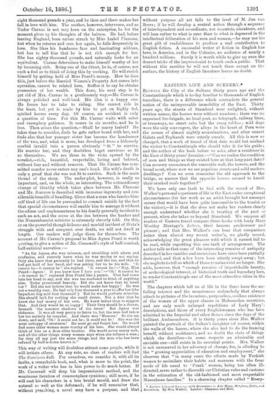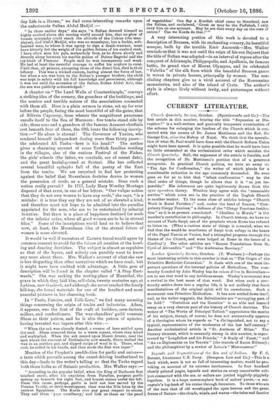EASTERN LIFE AND SCENERY.*
BETWEEN the City of the Sultans thirty years ago and the Constantinople which is to-day familiar to thousands of English travellers, there is a difference which contradicts the general notion of the unimprovable immobility of the East. Thirty years ago, the streets of Stamboul were unlighted, without written names, the houses were without numbers ; there was no organised fire-brigade, no local post, no telegraph, railway lines, or tramways, no street cabs but the crazy talikas ; wild dogs were the only scavengers, the alleys in the heart of Pera were the scenes of almost nightly assassinations, and after sunset Galata and Tophaneh were utterly unsafe. All this is now so changed, that a work of travel of that date would but mislead the visitor to Constantinople who should take it for his guide ; and the author of the book before us asks, after a residence in the East of thirty years' duration :—" Can we realise the condition of men and things as they existed here at that long-past date P Can memory reconstruct the venerable wall, the towers, and the broad moat, where now we see populous streets and solid modern dwellings ? Can we even remember the old approach to the bridge, so narrow that the opposite houses seemeel to knock their crooked roofs together ?"
We have only one fault to find with the record of Mrs. Walker's personal experience of life in the East under exceptional circumstances (for her work as an artist brought her amongst scenes that would have been quite inaccessible to the tourist or the visitor),—it is that she does not make her readers clearly enough understand whether she is treating of the past or present, when she takes us beyond Stamboul. We suppose all readers of Eastern travel compare those books with Lady Mary
Wortley Montagu's Letters, their famous predecessor and pioneer ; and that Mrs. Walker's can bear that comparison better than almost any recent writer's, we gladly record, acknowledging the great pleasure with which it cannot fail to be read, while regretting this one fault of arrangement. The author tells us that some of the interesting remains of antiquity described in her rambles and excursions have since been partially destroyed, and that a few have been utterly swept away ; but she neglects to tell us which of those remains exist no longer. She adds, however, that "enough remains of imperishable beauty, of archicological interest, of historical truth and legendary lore, to render Constantinople one of the most attractive cities in the world."
The chapters which tell us of life in the Serai have the un- failing interest and the monotonous melancholy that always attach to pictures of the luxurious, purposeless, soulless existence of the women of the upper classes in Ma.homedan countries, and are only much enlarged repetitions of Lady Mary's descriptions, and those of every Englishwoman who has been admitted to the Imperial and other Scrals since the days of the brilliant Ambassadress. It is thirty years since Mrs. Walker painted the portrait of the Sultan's daughter (of course, within the walla of the harem, where she also had to do the framing herself, without assistance), and no doubt the state of things which she describes—in some respects an admirable and. enviable one—still exists in its essential points. Mrs. Walker is not unreserved in her advocacy of change, for, in alluding to the "growing appreciation of education and employment," she observes that "in many cases the efforts made by Turkish women to assimilate their habits and manners with the freer mode of life usual to ' Frank ' women, being too often ill- directed, serve rather to discredit 'itir Christian rules and customs in the estimation of the old-fashioned and most respectable Mussulman families." In a charming chapter called "Every.
Easiern Life and Scenery ; lath Excursions in Asia MAIM MittAtne. Crete, and Roumania. By Mrs. Welker. Loudon : Chapman and Hall.
day Life in a Harem," we find some interesting remarks upon the unfortunate Sultan Abdul Medjid :—
"In those earlier days," she says, "a Sultan deemed himself so highly exalted above the moving world around him, that no glow of human sympathy could reach the altitude of the Unkiar (the man- slayer), and Abdul Medjid, who was no manslayer, but a feeble, soft- hearted man, to whom it was agony to sign a death-warrant, must have bitterly felt the weight of the golden fetters of his exalted rank. I have often seen his pale, melancholy face, as be drove slowly and drearily along between his marble palace of Dolma-Bagtch6 and the toy-kiosk of Flamonr. People said he was intemperate and weak. He had at least the merciful courage to suffer his nephew to exist. Until then, all princes, excepting those of the direct line, died in their infancy. This was a wicked custom, having almost the force of law, but when a son was born to the Sultan's younger brother, the child was kept in safety with his full knowledge and permission, although it was not until the accession of the father, Sultan Abdul Aziz, that the son was publicly acknowledged."
A chapter on "The Land Walls of Constantinople," conveys
a striking idea of the scenery, the grandeur of the buildings, and the sombre and terrible nature of the associations connected with them all. Here is a plain sermon in atone, set up for ever before the people, facing the most beautiful of all the gates, that of Silivria Caponssy, from whence the magnificent panorama unrolls itself to the Sea of Marmora : five tombs stand side by side ; three sons and a grandson of the famous Arnaout chieftain rest beneath four of these, the fifth bears the following inscrip- tion :—" He alone is eternal ! The Governor of Yanina, who rendered himself independent during more than thirty years— the celebrated Ali Pasha—here is his head !" The author gives a charming account of some Turkish families residing in the villages, also of the curious Festival of the Fishes, the girls' schools (the latter, we conclude, are of recent date), and the great burial-ground at Scutari. She has collected several beautiful epitaphs full of the poetry of the East from the tombs. We are surprised to find her protesting against the belief that Mussulman doctrine denies to women the possession of souls, as a general mistake. Does such a notion really prevail? In 1717, Lady Mary Wortley Montagu disposed of that error, in one of her letters. "Our vulgar notion that they do not own women to have any souls," she says, "is a mistake: it is true they say they are not of so elevated a kind,
and therefore must not hope to be admitted into the paradise appointed for the men, who are to be entertained by celestial bcauties. But there is a place of happiness destined for souls of the inferior order, where all good women are to be in eternal bliss." Some of the inscriptions would lead us to believe that now, at least, the Mussulman idea of the eternal future of
women is more elevated.
It would be well if narrators of Eastern travel would agree by common consent to avoid for the future all mention of the howl- ing and dancing dervishes. The subject is almost as repulsive as that of the lepers, and nobody can possibly want to know any more about them. Mrs. Walker's account of what she saw is less disgusting than other narratives which we have read ; but it might have been omitted with advantage. A little gem of description will be found in the chapter called "A Step East- wards." She was seeking the resting-place of Hannibal, the grave in which they laid him, self-slain, twenty centuries ago, at Lybissa, now Guebseb, and although she never reached the lonely hill-top, she found materials for one of the loveliest and most peaceful pictures in her charming book.
In "Facts, Fancies, and Folk-Lore," we find many amusing things concerning the origin of trades and industries. Adam, it appears, was the first of the craft of builders, corn-factors, millers, and confectioners. The wax-chandlers' guild venerate Shem as their patron, and he is also the patron of apiaries, having invented wax tapers after this wise :—
"When the ark was already floated, a swarm of bees settled upon the roof. Shem removed them to a warm corner, where they hived and multiplied. When the ark rested upon Mount Ararat, near the spot where the convent of Etchiniazim now stands, Shem melted the wax in an earthen pot, and dipped strips of wool in it. These, when cool, he rolled in his hands, and thus made the first wax taper."
Mention of the Prophet's predilection for garlic and onions— a taste which prevails among the camel-driving brotherhood to this day—leads to the writer's telling vs that the Turks regard both those bulbs as of Satanic production. Mrs. Walker nays :—
" According to the popular belief, when the King of Darkness first touched earth, after his expulsion from Paradise, pungent garlic sprung up beneath his right foot, and honest onions under the left. From this cause, perhaps, garlic is held not less sacred by the Persian Yezidy, or devil-worshippers, than was the Nile lotus by the ancient Egyptians. The Kurds also pay great respect to onions. They call them your excellency,' and look on them as the pearl
of vegetables.' One day a Kurdish chief came to Stamboul, saw the Sultan, and exclaimed, Great as may be the Padishah, I only envy him on one account. May he not dine every day on the core of onions ? Can we Kurds do that ?' "
A very interesting portion of this work is devoted to a description of Bronssa, with its enchanting scenery, its beautiful mosque, built by the terrible Emir Amurath—Mrs. Walker reminds us that it was not until the reign of his son Bajazet that the title of Sultan was adopted—in an interval of repose after the conquest of Adrianople, Philippopolis, and Apollonia, its famous baths, its grand view of Mount Olympus, and its celebrated "Fabrika " of the silk from which the beautiful Broussa gauze is woven in private houses, principally by women. The con- cluding chapters give us a vivid account of the Roumanian monasteries, and also of the island of Crete. The author's style is always lively without levity, and picturesque without effort.



































 Previous page
Previous page